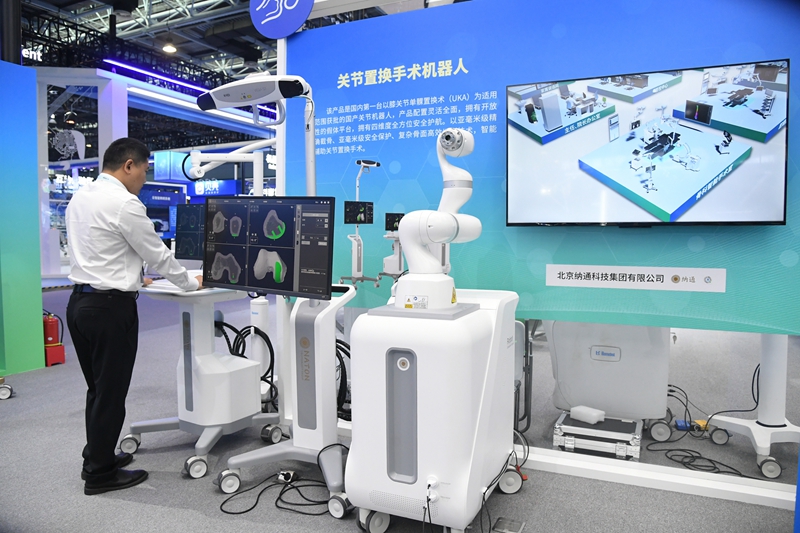In addition to this device for patients, the hospital has also introduced a groundbreaking AI-assisted TCM diagnosis system for doctors in consultation rooms. After receiving inputs about the patient's symptoms, the AI system provides diagnostic information and recommends classic herbal formulas from TCM literature, aiding physicians in prescribing tailored treatments.
As the first hospital in Chizhou to adopt AI diagnostic systems, the institution is now advancing plans to deploy these technologies across 28 TCM clinics in Guichi District in Chizhou, aiming to enhance grassroots-level TCM services.
The hospital is collaborating with tech developers to integrate DeepSeek's advanced AI solutions into its existing systems by the end of March. This upgrade is expected to significantly boost diagnostic efficiency and accuracy, further bridging the gap between ancient medical wisdom and cutting-edge technology.
Empowered by AI
In Hefei, the capital of Anhui Province, the First Affiliated Hospital of the University of Science and Technology of China (USTC) has pioneered the localized application of DeepSeek to healthcare in the city. It ensures that patient data remains within the hospital during model training and data processing, strictly safeguarding medical data security and patient privacy.
Liu Lianxin, a member of the 14th National Committee of the Chinese People's Political Consultative Conference (CPPCC) and the Secretary of the hospital's Communist Party of China Committee, attaches importance to innovation and the application of scientific achievements.
This year, he focuses his proposal to the CPPCC National Committee on the advancements in modern technology, particularly the effective application of AI software like DeepSeek in the medical field, which enhances the precision and efficiency of medical diagnoses.
"Our country has a large population and vast regions and experiences a diverse range of health conditions," he told local newspaper Anhui Daily. "The medical field generates a large amount of data daily, including electronic medical records, medical imaging and laboratory test results. Through big data technology, these scattered data can be integrated into an effective, detailed and comprehensive database. AI can utilize this database, along with existing medical knowledge, to assist doctors in making diagnostic decisions."
For grassroots doctors, the advantages of a vast medical database are even more pronounced. AI models like DeepSeek can be deeply embedded into medical scenarios. The system can learn from massive medical data and exemplary treatment cases to provide first-contact doctors with rapid and accurate diagnostic suggestions, effectively improving diagnostic efficiency and accuracy while reducing the risk of misdiagnosis and missed diagnosis.
Liu noted that although AI and big data technologies have broad application prospects in the medical field, they also face challenges. He pointed out that at this stage, AI serves as a good auxiliary tool, while a careful evaluation of its suggestions is crucial. This requires doctors with solid expertise and rich experience to collaborate with AI, complementing each other's strengths to make final diagnoses for patients.
Geng Funeng, a deputy to the 14th NPC and Chairman of Good Doctor Pharmaceutical Group, a major enterprise involved in TCM research, production and trade, views AI as a good tool to assist grassroots doctors. He believes that if well managed, AI doctors can bring quality medical resources and substantial benefits to residents of even the most remote regions.
"Currently, many hospitals in large cities are overcrowded. AI can make quality medical resources more accessible at grassroots levels, helping redirect many patients with common or routine problems to community and rural hospitals, thus addressing the difficulty in accessing medical care," he said at a forum on March 3, held in Beijing ahead of the opening of the annual legislative session.
Impact and challenge
Zhao Jing, a deputy to the 14th NPC, and Vice Chairman of Shandong Buchang Pharmaceuticals, highlighted the role of AI in advancing intelligent manufacturing within the TCM industry. She emphasized the application of AI technologies to upgrade production processes, such as precise control of temperature and humidity, screening of herbal components and the establishment of a full-process quality traceability system. The Green Intelligent TCM Manufacturing Plant established by the company has achieved fully automated production, from the entry of raw materials to the delivery of finished products. Zhao proposed that governments should formulate specialized plans and support measures to guide the healthy development of intelligent manufacturing within the TCM industry.
Gan Huatian, a professor at West China Hospital of Sichuan University and a member of the CPPCC National Committee, also calls for the national legislative body to promptly establish and refine laws and regulations related to AI in healthcare.
The widespread application of AI in healthcare currently faces a series of legal, ethical, safety and technical challenges that urgently need to be addressed through legislation, Gan said.
For instance, AI does not possess any medical license, raising questions about accountability in the event of medical disputes. Additionally, there are safety concerns with AI in healthcare, such as potential algorithmic problems that could threaten patient safety.
Gan hopes that the national legislative body will quickly establish and refine laws and regulations concerning AI in healthcare, clarifying its legal status, usage boundaries, safety standards, and ethical guidelines. For example, enacting regulations for the management of AI medical applications, and amending the Law on Practicing Doctors to clarify the role, responsibilities, and status of physicians in AI healthcare. "Such legislation would provide legal safeguards for AI in the medical field," he said. BR



















